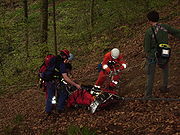
Wilderness medicine
Encyclopedia

Wilderness First Responder
Wilderness First Responders are individuals who are trained to respond to emergency situations in remote settings. They are part of a wide variety of wilderness medical professionals who deal with medical emergencies that occur in wilderness settings....
s, Wilderness EMTs, Remote/Offshore/Wilderness Paramedics and Physicians on expeditions, in outdoor education, search and rescue, mountain rescue, remote area operations including research, exploration, and offshore oil platforms, as well as tactical environments. In mainland Europe, where mountain rescue is done by paid professionals, there are courses for physicians that help qualify them to be mountain rescue or expedition doctors. Many of these courses lead to an International Diploma in Mountain Medicine, which is recognized by the Union Internationale des Associations Alpinistes.
US
In the United States, where mountain and other wilderness rescue on land is usually done by volunteers, there is no equivalent diploma. However, there are many wilderness medicine conferences at which medical professionals can earn continuing education credits, and some medical schools (for example, at the University of New Mexico) have begun offering electives in wilderness medicine. Other electives are based in community training centers and not medical schools, such as the Carolina Wilderness EMS Externship.WMS
The Internationally active Wilderness Medical SocietyWilderness Medical Society
The Wilderness Medical Society was created on the 15th of February 1983 by three doctors from California--Dr Paul Auerbach, Dr Ed Geehr, and Dr Ken Kizer. It provides advice and guidance to medical personnel working in wilderness or backcountry environments...
is an organization dedicated to wilderness medicine education and research, and they conduct multiple conferences annually in this area. Anyone who is interested in wilderness medicine can join the organization as an associate member, and receive their magazine, Wilderness Medicine. Their peer-reviewed journal, Wilderness and Environmental Medicine, is archived on their web site (www.wms.org), and back issues are accessible to the public at no cost.
Training in wilderness medicine is specialized, involving advanced practices and protocols due to the distance from hospitals and physicians. Common US certifications include Wilderness First Aid, Wilderness First Responder, and Wilderness EMT. While there is no legislation on standards of care for wilderness emergency care, there is a consensus of wilderness medical experts published by the Wilderness Medical Society
Med schools
Wilderness Medicine is popular in medical school communities, and many student groups hold their own Wilderness Medicine Conferences. One of the earliest examples is the Carolina Wilderness Medicine Seminar, organized at UNC-Chapel Hill by medical students Seth Hawkins and Jenny Graham in March 1998 and repeated in 2000. More recent and currently active examples include the Mid-Atlantic Student Wilderness Conference and the ACWM Southeast Student Wilderness Medicine Conference. The ACWM conference is notable in that it rotates to a new host medical school every year. All these conferences commonly feature prominent members of the wilderness medicine community as guest speakers and workshop leaders. Additionally, many top tier emergency physicians and surgeons are active in the field.Sports oriented institutions
Many organizations offer training in wilderness emergency care to lay people, which may include techniques that go beyond urban first aid or EMT training, such as reducing dislocations. The National Ski Patrol (www.nsp.org), a volunteer organization with a congressional charterCongressional charter
A congressional charter is a law passed by the United States Congress that states the mission, authority and activities of a group. Congress issued federal charters from 1791 until 1992 under Title 36 of the United States Code....
, has an 80-hour course to train patrollers, Outdoor Emergency Care, which meets the standards for an EMT (Emergency Medical Technician) course. The Wilderness Medicine Institute of NOLS, Wilderness Medical Associates, the Wilderness Medicine Training Center, Aerie Backcountry Medicine, Stonehearth Open Learning Opportunities (SOLO) and Remote Medical International offer courses up to the Wilderness EMT level. The American Safety & Health Institute (www.ashinstitute.org) has a Wilderness Emergency Care program that offers a full range of courses including Wilderness First Aid, Wilderness First Responder, and Wilderness EMT Upgrade. Most outdoor organizations that take people into wilderness settings now require their trip leaders, guides or camp councilors to be certified in such a course.
Other Educational Organizations
Wilderness Medical Society (WMS)Wilderness Medical Institute of NOLS (WMI)
Wilderness Medical Associates (WMA)
Center for Wilderness Safety (CWS)
Wilderness Medicine Outfitters (WMO)
Wilderness Medicine Training Center (WMTC)
Stonehearth Open Learning Opportunities Wilderness Medicine (SOLO)
American Red Cross (ARC)
Canadian Red Cross (CRC)
Remote Medical International (RMI)
Appalachian Center for Wilderness Medicine (ACWM)
See also
- Wilderness Medical SocietyWilderness Medical SocietyThe Wilderness Medical Society was created on the 15th of February 1983 by three doctors from California--Dr Paul Auerbach, Dr Ed Geehr, and Dr Ken Kizer. It provides advice and guidance to medical personnel working in wilderness or backcountry environments...
- Wilderness diarrhea
- Travel medicineTravel medicineTravel medicine or emporiatrics is the branch of medicine that deals with the prevention and management of health problems of international travelers.-Globalization and travel:...
- Wilderness medical emergencyWilderness medical emergencyMedical emergencies in areas of wilderness present particular challenges that can requires specialised responses.-Mass casualty incidents:These are incidents which produce an elevated number of injuries, such as blizzards, earthquake, avalanche, landslide, floods and forest fire...
- List of wilderness medical emergencies

